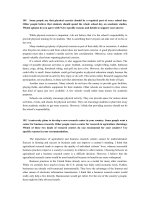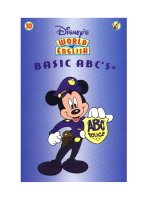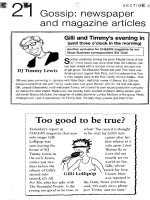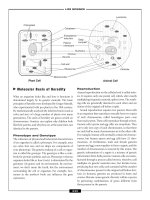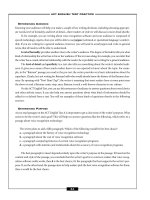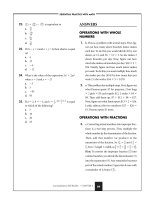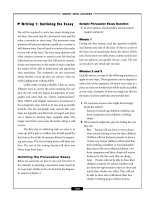ENGLISH-10-CK1-READ-CLOZE
Bạn đang xem bản rút gọn của tài liệu. Xem và tải ngay bản đầy đủ của tài liệu tại đây (78.81 KB, 4 trang )
A. READING
1. Read the passage carefully and choose the correct answers
If you want to take the whole family on holiday, and keep everybody happy, then I have found just
the place for you. I recently went with a group of friends to stay at the Greenwood Holiday Village,
which is open from May until October.
Built in the center of a forest, Greenwood is a great place to stay whatever the weather. Its main
attraction for families is the indoor World of Water, whether young and old can have fun in different
pools. Some of these, however, are for serious swimmers.
For sporty people, the Country Club offers tennis, squash and badminton. If your children are too
young to join in these sports, there are activity clubs. Greenwood is good place for families and it is
traffic free - you explore on foot or bike. Some people complained that this was inconvenienced, but I
was pleased to be out in the fresh air. For evening entertainment, there are shows and cinemas.
Accommodation is in a variety of apartments of different sizes. These have up to four bedrooms, a
kitchen and bathroom, as well as a dinning area. Before going, I thought the apartments might not be
big enough for all of us, but I was pleasantly surprised - it was not too crowded at all. I definitely go
back to Greenwood next year. Why don't you give it a try? Visit their website for further information
now.
1 What is the writer's main purpose in writing this text?
A. to give her opinion of the holiday village
B. to describe what her family did at the holiday village
C. to give advice to a friend going to the holiday village
D. to complain about the holiday village.
2 Which of the following activities is NOT mentioned for sporty people at Greenwood?
A. football
B. squash
C. swimming
D. badminton
3 Based on the information in the passage, it can be inferred that ___________.
A. the apartments at Greenwood are not big enough.
B. there is something at the holiday village for all ages.
C. it can only be enjoyed in good weather.
D. it is not convenient because you cannot use your car at the holiday village.
4 The word “these” in paragraph 2 refers to ________.
A. swimmers
B. young and old people C. families
D. pools
5 What will the writer do next year?
A. give Greenwood a try
B. go back to Greenwood C. visit their website
D. go to another place
2. Read the passage carefully and choose the correct answers
The computer is a wonderful machine. It is the most important invention since the type of engine used
in cars. It has had a great effect on science, industry, business, medicine, and education. Soon it will
touch the lives of everyone, even people in distant villages. The computer is a revolutionary invention.
The oldest kind of computer is the abacus, which has been used in China since the sixth century. In the
17th century an adding machine was invented. The first large, modern computer was built in 1937.
Computers improved quickly. A few years later a computer could do 5, 000 additions per second. Now
the computations are so fast they are measured in nanoseconds. (A nanosecond is one billionth of a
second!)
Today all computers are stored – program computers; that is, they have a processing unit, an arithmetic
and logic unit, and a memory. Computers are getting smaller and smaller, and computing faster and
faster. Even in a very small computer, the part that does the actual computing is about the size of the
end of a finger.
1. A stored – program computer has _______.
A. a brain
B. a robot
C. an abacus
D. a memory
2. The part of the computer that _____ is the size of the end of a finger.
A. gives a reply
B. stores the information
C. does the computing
D. prints the information
3. Computer computations are measured in ______.
A. seconds
B. nanoseconds
C. microseconds
D. milliseconds
4. According to the passage, computers will soon affect ______.
A. people in large cities
B. all of humanity
C. students and teachers
D. the population of developed countries
5. We can infer from the passage that the first modern computer _______________.
A. could do thousands of computations per second
B. was much larger than
today’s personal computer
C. was built in the 17th century
D. looked like the old kind of abacus
3. Read the passage carefully and choose the correct answers
For the last few months, I have spent every Saturday in my flat and have done nothing more exciting
than work at home, read the newspapers and watch television. I had begun feeling bored with this and
so, last weekend I thought I would do something different. I rang up several of my friends and we
decided to go to London for a day. I was really excited as I hadn't been to London since I was ten. We
decided to go by coach as this was by far the cheapest means of transport that was available even
though it meant that we needed to get up very early. Once in London we decided to take a sightseeing
tour as we wanted to see some of the famous buildings. After the tour we bought some sandwiches and
ate them in a small park. In the afternoon two of us went shopping and the others went to the theatre.
We met up again at 6.30p.m and went to a small restaurant in Soho. The meal was really good but,
unfortunately, it took much longer than we had expected. We had to get to a taxi back to the coach
station. Luckily, we got there just two minutes before our coach left.
1. According to the passage, the writer __________.
A. usually spends his weekend at home.
B. went to London with some of his friends.
C. has lived in London for ten years.
D. feels bored with his life.
2. He felt so excited about going to London because __________.
A. he hadn't been there before.
B. he hadn't been there for ten years.
C he went there ten years ago.
D. he hadn't been there for a long time.
3. Why did they decide to go by coach?
A. Because it was available.
B. Because it was one of the most efficient means of
transport.
C. Because they wanted to start early. D. Because other means of transport were more expensive.
4. Which of the following is true?
A. They all went shopping before going to theater.
B. They made a sightseeing tour of London and then had lunch.
C. They had lunch in a small restaurant.
D. They left the city at 6:30 p.m.
5. It can be inferred from the text that __________.
A. they nearly missed the coach because of the meal.
B. they didn't enjoy the meal in the restaurant very much.
C. the coach had already left when they got to the station.
D. they missed the coach and had to take a taxi back.
4. Read the passage carefully and choose the correct answers
Television has an enormous effect on Americans. Politicians know all about this so they try to make
their big public speeches at times when they get the largest audiences on the evening news
programs. Advertisers also understand the power of television. They are willing to spend billions of
dollars a year on television advertising. On average, American people watch TV for about 30 hours
a week. By the age of eighteen, an American child will have spent between 15,000 and 18,000
hours in front of the television, meanwhile only 11,000 hours at school. Many people admit that
watching violence on TV leads to greater violence on the streets. However, television programs
have not been much better and they are more interested in what is shown on TV than its bad effects.
The majority of TV viewers say that they prefer to see fewer soap operas and crime series, and more
history, drama and science. One reason for the poor quality is that the TV companies make most of
their money by selling advertising. Advertisers pay more money for time during popular show,
especially in the evening, when the audiences are the biggest.
1. There are the largest TV viewers ____________.
A. in the evening
B. in the afternoon
C. in the morning
D. at night
2. The word “enormous” in the first sentence has a close meaning to ________.
A. bad
B. low
C. small
D. great
3. TV __________.
A. has no effects on Americans’ life.
B. is used by both politicians and advertisers
C. has no advertisements
D. has no power in
advertising
4. TV gets most of the money from __________.
A. advertisers
B. politicians
C. TV viewers
D. film makers
5. The majority of TV viewers prefer to see _________.
A. violence
B. advertisements
C. history, drama, and science
D. soap operas and
crime series
B. CLOZE TEXT
1 Fill in each numbered blank with one suitable word or phrase
Louis Braille was born in 1809 in Coupvray. He was a French (1) _____ of the blind. He himself was
blind from the age of three, and in 1818 he went to the National Institute (2) ____ the Young Blind in
Paris. Soon showing marked ability in both science and music, he became famous in Paris (3) _____ an
organist and violoncellist. In 1826 Braille began teaching the blind in the institute. Braille is known for
his idea of (4) ____ the Barbier “pointing writing” system, used for coded army messages, to enable the
blind to read. Point writing (5) ____ of embossed dots and dashes on cardboard; the Braille system
derived from it is used successfully today, in slightly modified form, and in many countries.
1. A. designer
B. doctor
C. teacher
D. lawyer
2. A. for
B. of
C. to
D. with
3. A. like
B. as
C. such as
D. for
4. A. expressing
B. learning
C. bringing
D. modifying
5. A. contains
B. combines
C. consists
D. comprises
2 Fill in each numbered blank with one suitable word or phrase
The electric computer is the most (6) ____ invention since steam engine. While the industrial
revolution previously changed the nature of manual work, the computer revolution is now changing the
work (7) _____ by the brain. Nowadays micro – computers are (8) _____ in hundreds of thousands and
are constantly being equipped with more and more ingenious devices. Contrary to popular belief,
computers (9) ____ cannot make mistakes. The answer will always be correct (10) ____ the
programme fed into the computer is correct.
6. A. powerful
B. significant
C. strange
D. mysterious
7. A. doing
B. does
C. did
D. done
8. A. manufactured
B. done
C. worked
D. performed
9. A. which
B. that
C. itself
D. themselves
10. A. if
B. unless
C. whether
D. while
3 Fill in each numbered blank with one suitable word or phrase
The Lake District is a national park and World Heritage Site in North-West England. It is home to the
highest mountain in England - Scafell Pike, and the deepest lake - Wastwater. It is popular (11) ____
both day visitors and holidaymakers (12) ____ its beautiful mountains and lakes. The landscapes of the
Lake District have been (13) ____ over millions and millions of years. Rocks such as sandstone,
limestone and granite gradually formed in layers. Next, tectonic plates created volcanoes and also
pushed the rock up to create high mountains.
The Lake District is also home to lots of plants and animals and also people, who live in towns such as
Keswick and Windermere. (14) ____ is an important industry here, with over 12 million visitors every
year who come to walk, cycle, run, boat or just to look at the amazing (15) ____.
11. A. from
12. A. despite
13. A. made
14. A. Tourists
15. A. pictures
B. about
B. although
B. done
B. Tourism
B. countryside
C. for
C. because of
C. manufactured
C. Touring
C. views
D. with
D. because
D. created
D. Tour guide
D. scenery
